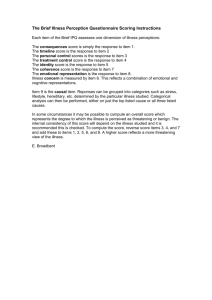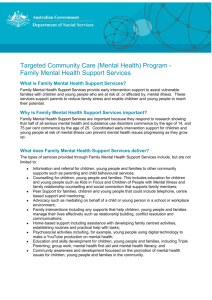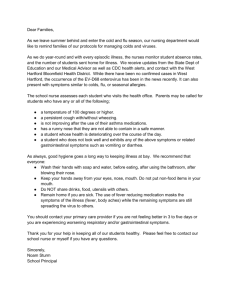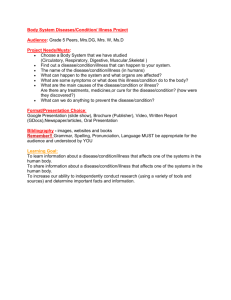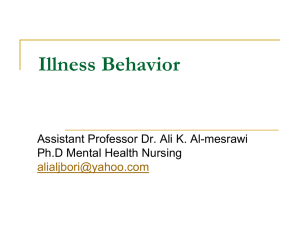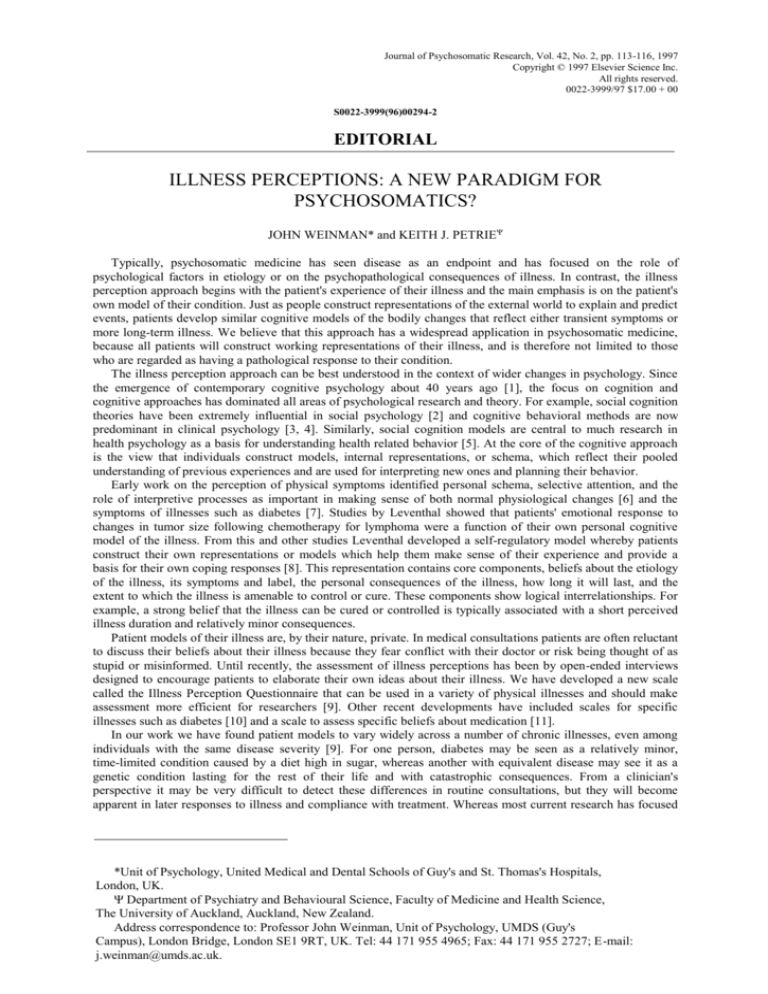
Journal of Psychosomatic Research, Vol. 42, No. 2, pp. 113-116, 1997
Copyright © 1997 Elsevier Science Inc.
All rights reserved.
0022-3999/97 $17.00 + 00
S0022-3999(96)00294-2
EDITORIAL
ILLNESS PERCEPTIONS: A NEW PARADIGM FOR
PSYCHOSOMATICS?
JOHN WEINMAN* and KEITH J. PETRIEΨ
Typically, psychosomatic medicine has seen disease as an endpoint and has focused on the role of
psychological factors in etiology or on the psychopathological consequences of illness. In contrast, the illness
perception approach begins with the patient's experience of their illness and the main emphasis is on the patient's
own model of their condition. Just as people construct representations of the external world to explain and predict
events, patients develop similar cognitive models of the bodily changes that reflect either transient symptoms or
more long-term illness. We believe that this approach has a widespread application in psychosomatic medicine,
because all patients will construct working representations of their illness, and is therefore not limited to those
who are regarded as having a pathological response to their condition.
The illness perception approach can be best understood in the context of wider changes in psychology. Since
the emergence of contemporary cognitive psychology about 40 years ago [1], the focus on cognition and
cognitive approaches has dominated all areas of psychological research and theory. For example, social cognition
theories have been extremely influential in social psychology [2] and cognitive behavioral methods are now
predominant in clinical psychology [3, 4]. Similarly, social cognition models are central to much research in
health psychology as a basis for understanding health related behavior [5]. At the core of the cognitive approach
is the view that individuals construct models, internal representations, or schema, which reflect their pooled
understanding of previous experiences and are used for interpreting new ones and planning their behavior.
Early work on the perception of physical symptoms identified personal schema, selective attention, and the
role of interpretive processes as important in making sense of both normal physiological changes [6] and the
symptoms of illnesses such as diabetes [7]. Studies by Leventhal showed that patients' emotional response to
changes in tumor size following chemotherapy for lymphoma were a function of their own personal cognitive
model of the illness. From this and other studies Leventhal developed a self-regulatory model whereby patients
construct their own representations or models which help them make sense of their experience and provide a
basis for their own coping responses [8]. This representation contains core components, beliefs about the etiology
of the illness, its symptoms and label, the personal consequences of the illness, how long it will last, and the
extent to which the illness is amenable to control or cure. These components show logical interrelationships. For
example, a strong belief that the illness can be cured or controlled is typically associated with a short perceived
illness duration and relatively minor consequences.
Patient models of their illness are, by their nature, private. In medical consultations patients are often reluctant
to discuss their beliefs about their illness because they fear conflict with their doctor or risk being thought of as
stupid or misinformed. Until recently, the assessment of illness perceptions has been by open-ended interviews
designed to encourage patients to elaborate their own ideas about their illness. We have developed a new scale
called the Illness Perception Questionnaire that can be used in a variety of physical illnesses and should make
assessment more efficient for researchers [9]. Other recent developments have included scales for specific
illnesses such as diabetes [10] and a scale to assess specific beliefs about medication [11].
In our work we have found patient models to vary widely across a number of chronic illnesses, even among
individuals with the same disease severity [9]. For one person, diabetes may be seen as a relatively minor,
time-limited condition caused by a diet high in sugar, whereas another with equivalent disease may see it as a
genetic condition lasting for the rest of their life and with catastrophic consequences. From a clinician's
perspective it may be very difficult to detect these differences in routine consultations, but they will become
apparent in later responses to illness and compliance with treatment. Whereas most current research has focused
*Unit of Psychology, United Medical and Dental Schools of Guy's and St. Thomas's Hospitals,
London, UK.
Ψ Department of Psychiatry and Behavioural Science, Faculty of Medicine and Health Science,
The University of Auckland, Auckland, New Zealand.
Address correspondence to: Professor John Weinman, Unit of Psychology, UMDS (Guy's
Campus), London Bridge, London SE1 9RT, UK. Tel: 44 171 955 4965; Fax: 44 171 955 2727; E-mail:
j.weinman@umds.ac.uk.
on coping as a way of explaining illness adjustment and outcome, we believe that illness perceptions may not
only explain the variety of coping responses to the same illness but also be more directly related to such
outcomes as adherence emotional distress
Some clear examples of the importance of patient models of illness in directing health-protective behavior,
recovery, and disability can be seen in recent work on women with breast cancer in remission, myocardial
infarction patients, and chronic fatigue syndrome sufferers. Cameron [13] found, in a clinical placebo-controlled
trial of tamoxifen, that the side effects of the active treatment served as a reminder of cancer risk and that by
activating these illness representations they triggered associated worries about cancer, resulting in higher levels
of breast self examination A recent study that we conducted showed that patients' beliefs about their heart attack
soon after admission to hospital predicted later attendance at a rehabilitation program and also how quickly
patients returned to work and regained normal functioning [14]. The illness perception component most closely
related to return to work and functioning was the perceived consequences of the heart attack. Those patients who
believed that the illness would have a serious effect on their lives were slower to return to work regardless of the
severity of the MI. We have found a similar pattern in chronic fatigue syndrome (CFS) sufferers. Those who
catastrophized about the consequences of pushing themselves beyond their present physical state were more
likely to report higher levels of fatigue and to be impaired in their ability
Illness perceptions are central not only for understanding responses to specific diseases but also can be used
to interpret patients reactions to genetic testing and health screening data, such as the results of cholesterol tests.
Research on the understanding of genetic testing suggests that individuals have quite complex models of the risk
of disease and find a simple genetically determined illness hard to conceptualize. More often people see the
development of a genetic disease ultimately determined not only by their genetic make-up but also by lifestyle
factors such as stress [16]. Much of the current evidence also points to the fact that systematic cognitive biases
are employed by individuals to minimize the threatening nature of health information either by downplaying the
seriousness of the test result, discrediting the accuracy of the test, or distorting the prevalence of a positive result.
Recent work has also shown that memory for health information, such as the results of cholesterol testing was
biased in a positive direction with individuals more likely to have reported their cholesterol level as being lower
than it actually was, particularly if they had an unacceptably higher cholesterol level [17].
Many interventions currently used in the psychosomatic area such as cardiac rehabilitation and pain
management programs, have been developed empirically and are not based on a sound theoretical understanding
of underlying psychological processes. In our work to date we have identified a number of specific patient cognitions that can act as either a help or a hindrance to illness adjustment. We believe this approach offers an
opportunity for researchers to identify the critical factors in patients' adaptation to illness. Furthermore, this
approach can facilitate the development of interventions that modify or take account of specific patient cognitions
such as beliefs about the cause or potential for control/cure of an illness. This view of the patient is compatible
with the emerging view of health care that sees the patient as taking a more active and informed role. Patients are
now requesting a more collaborative relationship in which their beliefs and expectations are acknowledged in
consultations and treatment. Early exploration and identification of patients' perceptions offers the opportunity of
minimizing or avoiding later difficulties such as nonadherence to treatment or recommended behavior changes.
An understanding of illness perceptions is essential for effective patient management, and we believe that this
approach has enormous potential for research and practice in the area of psychosomatic research.
REFERENCES
1.
2.
3.
Gardner H. The minds new science: a history of the cognitive revolution. New York: Basic Books 1985.
Fiske ST, Taylor SE. Social cognition. New York: MeGraw-Hill 1991.
Beck AT, Emery G. Anxiety disorders and phobias: a cognitive perspective. New York: Basic Books
1985.
4. Hawton K, Salkovskis PM, Kirk J, Clark 13M. Cognitive behaviour therapy for psychiatric problems: a
practical guide. Oxford: Oxford University Press 1989.
5. Conner M, Norman P. Predicting health behaviour. Buckingham: Open University Press 1996.
6. Pennebaker JW. The psychology of physical symptoms. New York: Springer 1982.
7. Gonder-Frederick L, Cox DJ. Symptom perception, symptom beliefs and blood glucose discrimination
in the self treatment of insulin dependent diabetes. In: Skelton JA, Croyle RT, eds. Mental representations in health and illness. New York: Springer Verlag 1991.
8. Leventhal H, Nerenz D, Steele DJ. Illness representations and coping with health threats. In: Baum A,
Taylor SE, Singer JE, eds. Handbook of psychology and health. Hillsdale, New Jersey:
Erlbaum,1984:219-252.
9. Weinman J, Petrie KJ, Moss-Morris R, Horne R. The Illness Perception Questionnaire: a new method
for assessing the cognitive representation of illness. Psychol Health 1996;11:431-446.
10. Hampson SE, Glasgow RE. Dimensional complexity of representations of diabetes and arthritis. Basic
Appl Soc Psychol 1996;18:45-59.
11. Horne R. Representations of medication and treatment: advances in theory and measurement. In Petrie
KJ, Weinman J, eds. Perceptions of health and illness: current research and applications. London:
Harwood Academic Press 1997.
12. Moss-Morris R, Petrie KJ, Weinman J. Functioning in chronic fatigue syndrome: do illness perceptions
play a regulatory role? Br J of Health Psychol 1996;1:15-26.
13. Cameron LD. Screening for cancer: illness perceptions and illness worry. In: Petrie KJ, Weinman J, eds.
Perceptions of health and illness: current research and applications. London: Harwood Academic Press
1997.
14. Petrie KJ, Weinman J, Sharpe N, Buckley J. Role of patients view of their illness in predicting return to
work and functioning after myocardial infarction: longitudinal study. BMJ 1996;312:1191-1194.
15. Petrie KJ, Moss-Morris R, Weinman J. The impact of catastrophic beliefs on functioning in chronic
fatigue syndrome. J Psychosom Res 1995;39:31-37.
16. Michie S, McDonald V, Marteau T. Understanding responses to predictive genetic testing: a grounded
theory approach. Psychol Health 1996;11:455-470.
17. Croyle RT, Sun YC, Hart M. Processing risk factor information: defensive biases in health related
judgements and memory. In: Petrie KJ, Weinman J, eds. Perceptions of health and illness: current
research and applications. London: Harwood Academic Press 1997.



